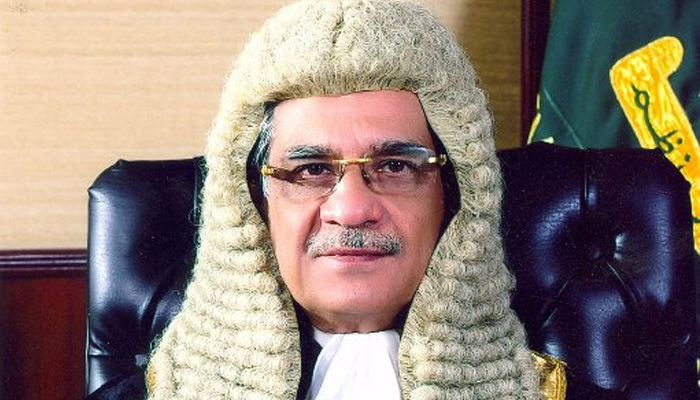Under what law POL products being taxed: CJP
KARACHI: The Supreme Court on Thursday directed the Ministry of Petroleum, Pakistan State Oil (PSO), Oil and Gas Regulatory Authority (Ogra) and others to file comprehensive statements along with details of the last six months of petroleum import bidding and justification of government levy and other charges in fixation of oil prices.
Hearing suo motu proceeding pertaining to high prices of petroleum products, the Supreme Court’s three-member bench headed by Chief Justice of Pakistan (CJP) Mian Saqib Nisar questioned that under what law taxes had been imposed on petroleum products, observing that people had become deranged for being overburdened.
The court inquired from the PSO deputy managing director as to how the prices were fixed. Yaqoob Suttar submitted that the PSO is the largest importer of crude oil from international market, which is obtained through the lowest bidding. He said PSO had imported 266.66 mmp worth Rs16.6 billion. About fixation of oil products' prices, he submitted they are fixed through a monthly mechanism that includes cost of import oil, Rs9.8 per litre government levy, Rs3.83 per litre trade pool to equalise oil prices, Rs3.383 per litre oil marketing companies margin, Rs2.55 dealers commission and general sales tax of 15%.
He said PSO has Rs300 billion outstanding against different ministries including that of water and power, which is yet to be recovered. To a court’s query, he said PSO has obtained Rs95 billion loan from banks for running its affairs for which it has to pay Rs7 billion mark up annually. The court took exception over PSO’s failure to recover Rs300 billion and for borrowing from banks to run its affairs.
The court observed that prima facie, there is something fishy in the purchase, import and the bidding process for the crude and hinted that this will be verified through independent auditors appointed by the court. The court observed that PSO and Ogra have to justify the price hike, as people are reeling under the increasing cost of petroleum products. The court asked the OGRA representative as why oil marketing companies were being given Rs3.38 per litre margin. The court also inquired from the FBR representative as why the chairman FBR did not appear despite notice. The FBR representative submitted that the chairman FBR was monitoring the amnesty scheme which was to be concluded by June 30. The court observed that FBR portal has been choked and the court knows about the scheme.
The court directed all the relevant secretaries, including chairman FBR, secretary Ministry of Petroleum, MD PSO, Ogra and others to appear before the court on Friday along with a comprehensive statement as well as with six months oil import bidding and justification for levy and the oil marketing companies margin, dealer commission and general sales tax on petroleum prices.
While hearing a human rights case with about frequent power breakdowns and loadshedding in Karachi and other parts of the province, the CJP directed the K-Electric to file an undertaking that there will be no loadshedding in the city and the power utility will upgrade its power distribution infrastructure.
To a court’s query, the KE representative said Karachi has a demand of 3,336 MW during summers, which is to be adjusted by the power utility through its 2,569 MW production. He said they had reduced loadshedding in 65% areas of the city and infrastructure had been improved in the high loss areas including Al-Azam Square and the F.B Area. He said KE is investing in infrastructure and new meters and wires had been installed for uninterrupted power supply.
The court observed that it seems that power crisis is due to lack of proper power distribution infrastructure and directed the KE to upgrade the infrastructure. The court observed that the KE should also use other resources instead of gas supply as the performance of Sui gas company is not up to the mark.
The civil society counsel, Faisal Siddiqui, said the KE did not implement the National Electric Power Regulatory Authority’s recommendations for upgradation of the system and full utilization of its power generations.
The court observed that it wanted to create facilities for the citizens of Karachi and KE and all the other concerned should make efforts to end loadshedding in the city and for this the Supreme Court is ready to help the power generation company. The court directed KE to submit an undertaking that there shall be no loadshedding and the weak and fragile power distribution system will be upgraded.
Meanwhile, the court also directed all the loan defaulters to refund the loans. The court observed that every loan defaulter is portraying their inability to pay the debt and when their claim is verified, they are found roaming in luxury vehicles. The court observed that every single citizen of the country is in debt of Rs117,000 and the court will not let the future generation remain indebted.
The Supreme Court also turned down the request of the advertisers for allowing them to use walls in different parts of city for advertisements and directed the provincial government to formulate a proper protocol for advertisement business.
Hearing the application against the construction of walls in different parts of the city for advertisement purpose, the Supreme Court’s three-member bench, headed by the CJP, observed that the walls could not be allowed for advertising.
The advertisers complained they are facing hardships due to restrictions in their businesses and requested the court to direct the authorities to formulate SOPs for their business. The CEO of a Karachi Cantonment Board submitted that six out of 13 walls had been demolished.
Hearing a petition about the failure to supply clean drinking water and lack of sewerage system in the province, the SC’s three-member bench, headed by Justice Saqib Nisar, took notice of the discharge of untreated effluent into the sea and observed what did the previous government do in the last 10 years.
The chairman Taskforce informed the court that due to the efforts of the water commission, Rs14 billion have been saved and the water supply scheme at Manchar lake has been upgraded. The court observed that it is the promise of the court to the citizens that it will provide clean drinking water at all costs.
The CJP also heard human rights cases and issued directions to the authorities to redress the complainants. The CJP directed the Board of Revenue, KMC and others to file comments on an application seeking allocation of space for new graveyards in the city.
-
 Gigi Hadid Talks About 'relieving Tension' Amid Having Hashimoto's Disease
Gigi Hadid Talks About 'relieving Tension' Amid Having Hashimoto's Disease -
 Sarah Ferguson Is 'persona Non Grata', Prince William Makes It Clear To Everyone
Sarah Ferguson Is 'persona Non Grata', Prince William Makes It Clear To Everyone -
 Northern Lights Alert On Valentine’s Day: How, Where & Best Time To Watch Auroras
Northern Lights Alert On Valentine’s Day: How, Where & Best Time To Watch Auroras -
 Dennis Quaid Reveals What Keeps His Marriage To Laura Savoie Healthy
Dennis Quaid Reveals What Keeps His Marriage To Laura Savoie Healthy -
 Mustafa Suleyman Says Microsoft Is Building Its Own AI Superintelligence
Mustafa Suleyman Says Microsoft Is Building Its Own AI Superintelligence -
 Jessica Alba, Cash Warren Finalize Divorce After 16 Years Of Marriage
Jessica Alba, Cash Warren Finalize Divorce After 16 Years Of Marriage -
 China’s AI Boom Takes Center Stage At Spring Festival One Year After DeepSeek Stirred The Industry
China’s AI Boom Takes Center Stage At Spring Festival One Year After DeepSeek Stirred The Industry -
 James Van Der Beek Called His Sixth Child Jeremiah 'healing For Us' Before His Death
James Van Der Beek Called His Sixth Child Jeremiah 'healing For Us' Before His Death -
 Elon Musk Vs Reid Hoffman: Epstein Files Fuel Public Spat Between Tech Billionaires
Elon Musk Vs Reid Hoffman: Epstein Files Fuel Public Spat Between Tech Billionaires -
 Gordon Ramsay Denies Victoria Beckham Got Handsy With Brooklyn At His Wedding
Gordon Ramsay Denies Victoria Beckham Got Handsy With Brooklyn At His Wedding -
 Gordon Ramsay Makes Unexpected Plea To Brooklyn As He Addresses Beckham Family Feud
Gordon Ramsay Makes Unexpected Plea To Brooklyn As He Addresses Beckham Family Feud -
 Prince Harry Warns Meghan Markle To 'step Back'
Prince Harry Warns Meghan Markle To 'step Back' -
 Selena Gomez Explains Why She Thought Lupus Was 'life-or-death'
Selena Gomez Explains Why She Thought Lupus Was 'life-or-death' -
 New Zealand Flood Crisis: State Of Emergency Declared As North Island Braces For More Storms
New Zealand Flood Crisis: State Of Emergency Declared As North Island Braces For More Storms -
 Nancy Guthrie Case: Mystery Deepens As Unknown DNA Found At Property
Nancy Guthrie Case: Mystery Deepens As Unknown DNA Found At Property -
 James Van Der Beek's Brother Breaks Silence On Actor's Tragic Death
James Van Der Beek's Brother Breaks Silence On Actor's Tragic Death




